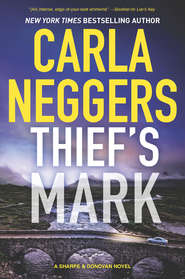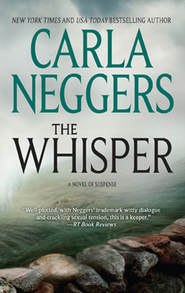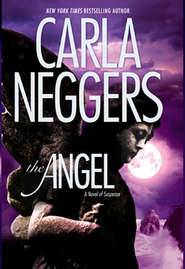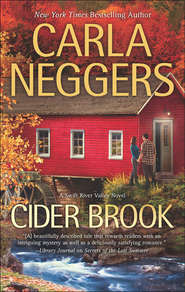По всем вопросам обращайтесь на: info@litportal.ru
(©) 2003-2024.
✖
Cold Ridge
Автор
Год написания книги
2018
Настройки чтения
Размер шрифта
Высота строк
Поля
She tried to control her breathing, hoping the shooters wouldn’t hear her. But what was the point? They had to know now, after she’d screamed, that she was behind the boulder.
They’d known it before they’d shot at it.
She couldn’t stay where she was.
The low ridge crested fifteen feet above her. If she could get up the hill, she could slip down the other side and hide among the trees and boulders, make her way back to her car, call the police.
If the shooters tried to follow her, she’d at least see them up on the ridge.
See them and do what?
She pushed back the thought. She’d figure that out later. Should she stand up and run? Crouch? Or should she crawl? Scoot up the hill on her stomach? No scooting. She’d be like a giant fluorescent worm in her orange vest. Take it off? No—no time.
She’d take her day pack. It might stop or impede a bullet.
Or should she stay put? Hope they hadn’t seen her after all?
Every fiber in her body—every survival instinct she had—told her that she’d be killed if she stayed where she was.
She picked out the largest trees, a mix of evergreens and hardwoods, their leaves shed for the season, between her boulder and the ridgeline. The hillside was strewn with glacial boulders. It was New Hampshire. The Granite State.
Inhaling, visualizing her exact route, she crouched down racer-style, and, on an exhale, bolted up the hill. She ducked behind a hemlock straight up from her boulder, then ran diagonally to a maple, zigzagged to another hemlock, then hurled herself over the ridge crest. She scrambled downhill through a patch of switchlike bare saplings as three more quick shots boomed in the ravine on the other side of the ridge.
A whir, a cracking sound over her head.
Jesus!
They were shooting at her.
A crouched figure jumped out from behind a gnarled pine tree to her left, catching her around the middle with a thick arm, covering her mouth with a bare hand, then lunging with her back behind the tree.
“Carine—babe, it’s me. Tyler North. Don’t scream.”
He removed his hand, settling in next to her on the ground, and she jerked herself away, although not entirely out of his grasp. “Was that you shooting at me? You jackass.”
“Shh. It wasn’t me.”
She blinked, as if he might not be real, but she was sprawled against him, his body warm, solid. Tyler…Tyler North. He was at his most intense and focused. Combat ready, she thought, feeling a fresh jolt of fear. He was a PJ, an air force pararescueman. PJs were search-and-rescue specialists, the ones who went after pilots downed behind enemy lines. Carine had known Ty since they were tots. She’d heard he was home in Cold Ridge on leave—maybe the shooters were firing at him.
She tried to push back her fear and confusion. She’d been taking pictures, minding her own business. Then someone started shooting at her. Now she was here, behind a tree with Ty North. “Where—where did you come from?”
“I’m hiking with a couple of buddies. We saw your car and thought we’d join you for lunch. Figured you’d have better food.” He frowned at her, peeling hair off her forehead to reveal her cut, and she remembered his search-and-rescue skills included medical training above the level of a paramedic. “Piece of flying rock hit you?”
“I think so. Ty, I don’t know if they were aiming at you—”
“Let’s not worry about that right now. The cut doesn’t look too bad. Want to get out of here?”
She nodded, thinking she had to look like a maniac. Bloodied, twigs in her hair. Pant legs soaked and muddy. She was cold, but a long way from hypothermia.
Ty eased her day pack off and slung it over his shoulder. “We’re going to zigzag down the hill, just like you came up. That was good work. Hank Callahan and Manny Carrera are out here, so don’t panic if you see them.”
Hank Callahan was a retired air force pilot, and Manny Carrera was another pararescueman, a master sergeant like North. Carine knew them from their previous visits to Cold Ridge. “Okay.”
“All right. You got everything? If you’re woozy, I can carry you—”
“I’ll keep up.”
North grinned at her suddenly. “You’ve got the prettiest eyes. Why haven’t we ever dated?”
“What?”
As much as his question surprised her, he’d managed to penetrate the fear that seemed to saturate her, and when he took her hand, she ran with him without hesitation, using trees and boulders as cover, zigzagging down the hill, up another small, rounded hill. They ducked behind a stone wall above the leaf-covered stream she’d photographed earlier. Carine was breathing hard, her head pounding from fear and pain, the cut on her forehead bothering her now. They were getting closer to the main road. Her car. A place where she could call the police. She had a cell phone in her pack, but there was no service out here.
Leaves crunched nearby, and Hank Callahan joined them, exchanging a quick smile with Carine. He was square-jawed and blue-eyed, distinguished-looking, his dark hair streaked with gray. He had none of the compact, pitbull scrappiness of tawny-haired Tyler North.
“Christ, Ty,” Hank said in a low voice, “she’s hurt—”
“She’s fine.”
“I’m scared shitless! Those bastards were shooting at me!” Carine didn’t raise her voice, but she wasn’t calm. “Yahoos. Hunters—”
Hank shook his head, and Ty said, “Not hunters. A hunter doesn’t take a three-shot burst into a boulder, even if he’s using a semiautomatic rifle. These assholes knew you were there, Carine.”
“Me? But I didn’t do anything—”
“Did you see anyone?” Hank asked. “Any idea how many are out there?”
“No, no idea.” Her teeth were chattering, but she blamed the cold, not what Ty had said. “There’s an old hunting shack not far from where the bullets started flying. It looked abandoned to me. I took pictures of it. Maybe somebody didn’t like that.”
“I thought you took pictures of birds,” North said with a wry smile.
“I’m just most known for birds.” As a child, she’d believed she could see her parents as angels, soaring above Cold Ridge with a lone hawk or eagle. Ty used to tease her for it. “I was just trying out my digital camera.”
But she was breathing rapidly—too rapidly—and Ty put his hand over her mouth briefly. “Stop. Hold your breath a second before you hyperventilate.”
Already feeling a little light-headed, she did as he suggested. She noticed the green color of his eyes. That wasn’t a good sign. She’d never noticed anything about him before. She couldn’t remember when she’d seen him last. Fourth of July fireworks? They were neighbors, but seldom saw each other. His mother had moved to the valley just before Ty was born and bought the 1817 brick house that Abraham Winter, the first of the Cold Ridge Winters, had built as a tavern. She’d called herself Saskia, but no one believed that was her real name. If she had a husband, she’d never said. She was a weaver and a painter, but not the most attentive of mothers. Ty had pretty much grown up on his own. Even as a little boy, he’d wander up on the ridge trail for hours before his mother would even realize he was gone. She died four years ago, leaving him the house and fifty acres of woods and meadow. Everyone expected him to sell it, but he didn’t, although, given the demands of his military career, he wasn’t around much.
Hank Callahan shifted. “I don’t know about you, but I’d like to put some serious mileage between me and the guys with guns.”
Carine steadied her breathing. “What about your other friend Manny—”
“Don’t worry about Carrera,” Ty said. “He can take care of himself. What’s the best route out of here?”
“We could follow the stone wall. There’s an old logging road not far from the shack—”
He shook his head. “If the shooters are using the shack, that’s the road they’d take. They’ll have vehicles.”
She thought a moment. “Then we should follow the stream. It’s not as direct, but it’ll take us to where we parked.”











